World Premiere: The Sound World of Mark Winges
The world-premiere performances of Mark Winges' pax penetralis, commissioned by the San Francisco Choral Society, will take place on November 17 and 18, as part of SF Choral's year-long three-concert Season for Peace project featuring works inspired by the themes of war and peace.
Born in 1951 in Louisville, Kentucky, Mark Winges has lived in the Bay Area for many years. He is an organist and is composer/advisor for the renowned chamber choir Volti. Many of his compositions have been written for smaller groups, such as instrumental chamber ensembles, as well as for adult and children's choirs, organ, chamber orchestra, and solo voices. His fascination with sound and words has led to works with delightful titles, such as A Cricket Needs a Queen, Open the Book of What Happened, The Keeper of Moon-Flowers, Fog Patterns and Clouds, and Meeting Again the First Time One More Time. I asked Mark to describe the artistic process involved in the composition of his music:
"As with many of my pieces, pax penetralis starts with a particular (although rather abstract) sound - in this case, the sound of the chorus and strings. As I begin [composing] any piece, I always ask myself, What kind of sound-world does this group of musicians inhabit? Sometimes I start with a shape, or a gesture (rising, falling), or a dramatic progression, or even a literary or visual idea, and then that starting point works its way into sound. To cite specific examples, chorus and organ sounds have a different accent than chorus and strings. Not to mention another recent piece of mine, for viola, cello, and guitar, which doesn't even live in the same house. Each ensemble has its own character, and uncovering that character and presenting it in a clear way is one of the joys of composing.
"Of course, a significant part of the choral sound world is the text, and choosing texts is one of the joys in writing vocal music. Both the sound of the ensemble and the text influence musical gestures and shapes. In the case of pax penetralis, although Layman P'ang's text, 'When the mind is at peace/the world too is at peace,' introduced itself to me almost immediately, it was my discovery of the Rumi text that provided the central starting point for the work, especially its joyful 'We have fallen into the place/where everything is music.'
"One of the advantages of being local, and of having heard an ensemble several times, is that the work of that ensemble and its director provide a very specific aural image as a starting point for the composer. Having been to San Francisco Choral Society concerts many times, I sense a joyful seriousness in their approach to music making. I can't explain exactly how that is reflected in pax penetralis, but I do feel that it is a part of the piece."
Mark is local, indeed. He moved to California in 1975, and his first job was as the organist/choir director at St. Paul's Episcopal Church in San Rafael. From 1992-93, he was organist at the First Unitarian Universalist Church in San Francisco, where the choir director at the time was Bob Geary.
I mentioned to Mark that one of our singers, Anna Alessandria, who is Italian and a Latin scholar, had wondered if the piece's title, pax penetralis, might also mean "inner peace" as well as "peace passing through," the words that appear on the title page of our scores. Here is Mark's response: "Yes, pax penetralis can definitely mean 'inner peace'. I think I had stumbled on the Layman P'ang quote before I came up with the title peace passing through, which is as much a subtitle as a translation of the Latin. I sort of thought that 'peace passing through' sounded nice when you say it, and that it was close enough to the Latin that one could see they are related."
— O'Brien Young
O'Brien Young was born in Boston, grew up in New Mexico, and graduated from Harvard/Radcliffe. She studied voice at the Aspen Institute in Colorado, the New England Conservatory, and with mezzo soprano Jennie Tourel in New York City. Lifelong interests in music and literature have led her through careers as an operatic soprano, recitalist, and oratorio soloist; teaching classroom music and conducting children's choruses in elementary and junior high school; and working as an editor for various publications including the Time-Warner magazines
Parenting and Health.
Bob Geary on Mark Winges
In the early 1980s, I conducted the San Francisco Chamber Singers in a performance of a piece called Spool of Dream, for choir and percussion, by Mark Winges. My introduction to the sound world and imagination of Mark Winges caused a major expansion of my musical life. It was the first time that I had ventured into truly contemporary music, and the piece greatly expanded my skills and my understanding of the art of making music. Since that time, I've had the privilege of conducting the premieres of 16 of Mark's works. I've seen his masterpiece for treble voices, Magic Strings, go on to global acceptance. While I was choirmaster at the First Unitarian Universalist Church in San Francisco, Mark was interim organist for a year. We had a wonderful time working together in that community. Mark's is a unique voice. His approach to sound and text is completely original. His early work as an organist and oboist, plus the fact that he played bass in a rock band and is a big fan of Frank Zappa, can all be heard in his music. From a conductor's point of view, my working relationship with Mark has been a joy and a responsibility. Composers need a chance to be heard and to develop their craft, and conductors have a responsibility to make sure this happens. With pax penetralis, Mark has assembled texts that express several concepts of inner peace, which is the cornerstone for a greater world peace.
© Copyright 1998-2024 San Francisco Choral Society

